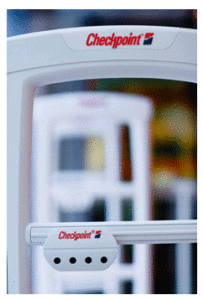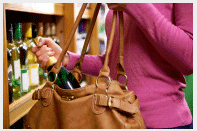Every year during my annual eye exam I am told that I need to not only wear glasses or contacts but I also need to have a good pair of sunglasses to protect my eyes from the UV lights. I always wear sunglasses because if I don’t I get headaches really bad from squinting. Although, if you ask my husband he will tell you that when it comes to sunglasses, I am very irresponsible. I can’t even tell you how many pairs of sunglasses I have either broken, scratched or lost over the years. I always tried to keep them in my purse, but inevitably they would get broken to bent or scratched to the point that I couldn’t even wear them anymore. I also tend to leave them laying around, which results in me forgetting where I put them or leaving them somewhere. My husband knows not to buy me expensive sunglasses for this reason. I typically buy the $5-$10 pair so that when I break them or lose them I don’t feel too bad about it, but they are not the highest quality of glasses. They tend to not provide the level of UV protection I need and they tend to be uncomfortable and not that appealing to look at. This year I decided that I needed to actually spend the money and make the commitment to take care of a quality pair of sunglasses. So my husband and I went to the mall looking for sunglasses. What an adventure that was! The store we went to only sold sunglasses and accessories, which was really nice. There were a ton of options and frames to choose from, but I also learned really quickly how expensive sun glasses can be. Several hundred dollars for a pair of sunglasses seemed excessive to me, but I was determined to get a decent pair that I could hopefully keep long term. While trying them on, I did notice that the store had taken steps to prevent shoplifting by adding Multi Tags to their more expensive glasses. I was aware of these types of tags, but I hadn’t really been to a store that used them so predominantly.
The Multi Tag is designed like any other hard tag, while still allowing the customer the ability to try on the item, without detracting from the product. These tags are easily attached to the frame of the glasses so that the customer can still try them on and determine if they are a good fit and style. They are equipped with EAS technology that provides an audible alarm to prevent shoplifting. They are very small, lightweight tags, which provide the retailer with an added level of protection for a low cost. The Multi Tags are easily removed at point of sale, and are re-useable. They are made of a durable material that makes it difficult to remove without damaging the product or setting off the alarm. These can also be used by optometrist offices and other retailers who sell any type of glasses. As prices for these types of items continue to increase, it is imperative that we take adequate steps to protect our merchandise from theft.
Personally experiencing the process of shopping for expensive eyewear, I can say that the Multi Tag did not deter or detract from my shopping experience. I felt like they were an ideal product to mitigate the store’s risk without hindering my shopping experience. If I ever decide to sell any highline glasses in my stores, I will definitely consider these tags as a means to prevent shoplifting, and reduce my exposure to theft. For those of you in this particular industry I would suggest you look into these tags as a means to reduce loss and increase profit.
Need information on the Multi tag? Give us a call at 1.770.426.0547 now.
 As many of you know Alpha High Theft Solutions was acquired by Checkpoint Systems many years ago. Checkpoint has encouraged Alpha’s brand growth and innovation. Alpha has produced the best high theft solutions, hands down in the industry. Innovations like Spider Wrap, Keepers, Bottle Locks, Cable Locks, Shark Tags, specialized hard tags literally protect billions of retail products worldwide.
As many of you know Alpha High Theft Solutions was acquired by Checkpoint Systems many years ago. Checkpoint has encouraged Alpha’s brand growth and innovation. Alpha has produced the best high theft solutions, hands down in the industry. Innovations like Spider Wrap, Keepers, Bottle Locks, Cable Locks, Shark Tags, specialized hard tags literally protect billions of retail products worldwide. I don’t know how many times I have heard it, but I have heard it said that shoplifting is not a crime that is premeditated. I have heard and read the arguments that dismiss the seriousness of the crime and portray the criminals as opportunists acting on the spur of the moment. Implicit in the argument is the minimizing of the extent of Organized Retail Crime rings as well as the willingness of shoplifters to steal from your customers. I have even had people who think along these lines voice their disapproval when I had shoplifters I had apprehended and was walking to my security office. I recall one occasion when I apprehended three young men, about 14 years of age and was by myself. I had them stand with their faces against the wall as I had to get my keys out to unlock the door to my office. Two men were sitting outside my office and one muttered under his breath that I was being a butt, only he used a more colorful adjective. I looked at him and told him to mind his own business. The point is that there are people more sympathetic to the criminals than retailers and see shoplifting as a minor infraction at worst and mischievous behavior at best. The attitude among those that hold to those beliefs might change if they realized that these shoplifters aren’t necessarily choosy about who they steal from. They also don’t consider the safety risks posed by the careless acts of these criminals.
I don’t know how many times I have heard it, but I have heard it said that shoplifting is not a crime that is premeditated. I have heard and read the arguments that dismiss the seriousness of the crime and portray the criminals as opportunists acting on the spur of the moment. Implicit in the argument is the minimizing of the extent of Organized Retail Crime rings as well as the willingness of shoplifters to steal from your customers. I have even had people who think along these lines voice their disapproval when I had shoplifters I had apprehended and was walking to my security office. I recall one occasion when I apprehended three young men, about 14 years of age and was by myself. I had them stand with their faces against the wall as I had to get my keys out to unlock the door to my office. Two men were sitting outside my office and one muttered under his breath that I was being a butt, only he used a more colorful adjective. I looked at him and told him to mind his own business. The point is that there are people more sympathetic to the criminals than retailers and see shoplifting as a minor infraction at worst and mischievous behavior at best. The attitude among those that hold to those beliefs might change if they realized that these shoplifters aren’t necessarily choosy about who they steal from. They also don’t consider the safety risks posed by the careless acts of these criminals. There seems to be an advice website or YouTube video for nearly everything these days. Want to know who to call for home repairs? Need information about a car before you buy it? Looking for someone to date? Yes, it’s all on the internet, I’ve even completed some plumbing repairs and small vehicle repairs with the aid of online videos. Unfortunately, while there is a lot of help and good information on the world wide web, there are also sites that purport to be “informational” only but the information they provide supposedly tells people how to shoplift. What I find even more irritating is that some of these theft websites allegedly are written by former Loss Prevention personnel. The information they give is sometimes too accurate and could cause problems for a retailer who isn’t informed themselves on how to prevent thieves from stealing from them.
There seems to be an advice website or YouTube video for nearly everything these days. Want to know who to call for home repairs? Need information about a car before you buy it? Looking for someone to date? Yes, it’s all on the internet, I’ve even completed some plumbing repairs and small vehicle repairs with the aid of online videos. Unfortunately, while there is a lot of help and good information on the world wide web, there are also sites that purport to be “informational” only but the information they provide supposedly tells people how to shoplift. What I find even more irritating is that some of these theft websites allegedly are written by former Loss Prevention personnel. The information they give is sometimes too accurate and could cause problems for a retailer who isn’t informed themselves on how to prevent thieves from stealing from them. Shortage control and theft prevention for small retailers which have no Loss Prevention Associates in the store was the topic of a recent article in an online loss prevention magazine. The points were well made and much of it was directed at stores that may have district or regional Loss Prevention Managers. But the truth is there are many small, independent retailers with no affiliation to a larger company. How do these stores cope with reducing shrink and preventing theft? It could be a tough problem but Loss Prevention Systems Inc. (LPSI)has the solutions that can keep small stores keep shortage down and profits up.
Shortage control and theft prevention for small retailers which have no Loss Prevention Associates in the store was the topic of a recent article in an online loss prevention magazine. The points were well made and much of it was directed at stores that may have district or regional Loss Prevention Managers. But the truth is there are many small, independent retailers with no affiliation to a larger company. How do these stores cope with reducing shrink and preventing theft? It could be a tough problem but Loss Prevention Systems Inc. (LPSI)has the solutions that can keep small stores keep shortage down and profits up. In some regions, police departments warn retail stores and home owners of an increase in shoplifting and burglaries during the summer months.
In some regions, police departments warn retail stores and home owners of an increase in shoplifting and burglaries during the summer months. Shoplifting is a crime.
Shoplifting is a crime. Preventing shoplifting is by far one of the major problem for big retailers. For the small retail store, shoplifting takes on a different meaning.
Preventing shoplifting is by far one of the major problem for big retailers. For the small retail store, shoplifting takes on a different meaning.